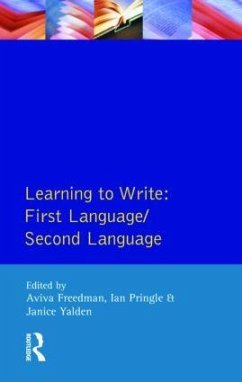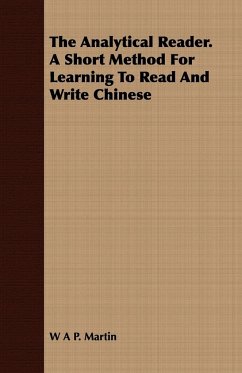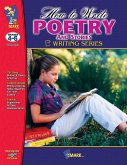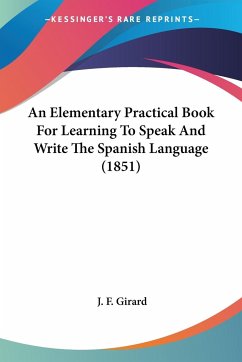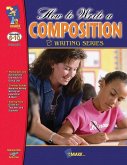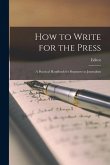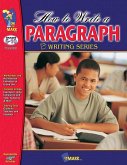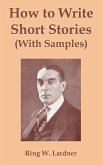- Broschiertes Buch
- Merkliste
- Auf die Merkliste
- Bewerten Bewerten
- Teilen
- Produkt teilen
- Produkterinnerung
- Produkterinnerung
First published in 1983. Routledge is an imprint of Taylor & Francis, an informa company.
Andere Kunden interessierten sich auch für
![The Analytical Reader. a Short Method for Learning to Read and Write Chinese The Analytical Reader. a Short Method for Learning to Read and Write Chinese]() W. A. P. MartinThe Analytical Reader. a Short Method for Learning to Read and Write Chinese27,99 €
W. A. P. MartinThe Analytical Reader. a Short Method for Learning to Read and Write Chinese27,99 €![How to Write Poetry & Stories Grades 4-6 How to Write Poetry & Stories Grades 4-6]() Vi ClarkeHow to Write Poetry & Stories Grades 4-613,99 €
Vi ClarkeHow to Write Poetry & Stories Grades 4-613,99 €![An Elementary Practical Book For Learning To Speak And Write The Spanish Language (1851) An Elementary Practical Book For Learning To Speak And Write The Spanish Language (1851)]() J. F. GirardAn Elementary Practical Book For Learning To Speak And Write The Spanish Language (1851)15,99 €
J. F. GirardAn Elementary Practical Book For Learning To Speak And Write The Spanish Language (1851)15,99 €![How to Write a Composition Grades 6-10 How to Write a Composition Grades 6-10]() Terry GaddHow to Write a Composition Grades 6-1015,99 €
Terry GaddHow to Write a Composition Grades 6-1015,99 €![How to Write for the Press: A Practical Handbook for Beginners in Journalism How to Write for the Press: A Practical Handbook for Beginners in Journalism]() EditorHow to Write for the Press: A Practical Handbook for Beginners in Journalism19,99 €
EditorHow to Write for the Press: A Practical Handbook for Beginners in Journalism19,99 €![How to Write a Paragraph Grades 5-10 How to Write a Paragraph Grades 5-10]() Terry GaddHow to Write a Paragraph Grades 5-1014,99 €
Terry GaddHow to Write a Paragraph Grades 5-1014,99 €![How to Write Short Stories with Samples How to Write Short Stories with Samples]() Ringgold Wilmer LardnerHow to Write Short Stories with Samples25,99 €
Ringgold Wilmer LardnerHow to Write Short Stories with Samples25,99 €-
-
-
First published in 1983. Routledge is an imprint of Taylor & Francis, an informa company.
Produktdetails
- Produktdetails
- Verlag: Routledge
- Seitenzahl: 312
- Erscheinungstermin: 7. März 1983
- Englisch
- Abmessung: 216mm x 140mm x 17mm
- Gewicht: 395g
- ISBN-13: 9780582553712
- ISBN-10: 0582553717
- Artikelnr.: 39215843
- Herstellerkennzeichnung
- Libri GmbH
- Europaallee 1
- 36244 Bad Hersfeld
- gpsr@libri.de
- Verlag: Routledge
- Seitenzahl: 312
- Erscheinungstermin: 7. März 1983
- Englisch
- Abmessung: 216mm x 140mm x 17mm
- Gewicht: 395g
- ISBN-13: 9780582553712
- ISBN-10: 0582553717
- Artikelnr.: 39215843
- Herstellerkennzeichnung
- Libri GmbH
- Europaallee 1
- 36244 Bad Hersfeld
- gpsr@libri.de
Edited by Aviva Freedman, Ian Pringle, Janice Yalden
Contents
Preface
Introduction
Part One: The writing process: three orientations
1. Shaping at the point of utterance James Britton
2. Does learning to write have to be so difficult? Carl Bereitter and
Marlene Scardamalia
3. New starts and different kids of failure H. G. Widdowson
Part Two: The development of writing abilities
4. The growth and development of first-grade writers Donald H. Graves
5. Assessing language development: the Crediton project Andrew Wilkinson
6. Toward a theory of development rhetoric Daniel R. Kirby and Kenneth J.
Kantor
7. Redefining maturity in writing Lee Odell
Part Three: Text and discourse
8. A pluralistic synthesis fo four contemporary models for teaching
composition James L. Kinneavy
9. Contrastive rhetorics: some implications for the writing process Robert
B. Kaplan
10. Syntactic skill and ESL writing quality Patrick T. Kameen
11. The reliability of mean T-unit length: some questions for research in
written composition Stephen P. Witte
Part Four: Implications for teaching
12. Writers and their writing, 15 to 17 Bruce Bennett
13. Scope for intentions Nancy Martin
14. Writing in response to literature John Dixon
15. Instructional focus and the teaching of writing James R. Squire
16. From classroom practice into psycholinguistic theory W. Ross Winterowd
17. Communicative writing practice and Aristotelian rhetoric Keith Johnson
18. Anguish as a second language? Remedies for composition teachers Ann
Raimes
Bibliography
Index
Preface
Introduction
Part One: The writing process: three orientations
1. Shaping at the point of utterance James Britton
2. Does learning to write have to be so difficult? Carl Bereitter and
Marlene Scardamalia
3. New starts and different kids of failure H. G. Widdowson
Part Two: The development of writing abilities
4. The growth and development of first-grade writers Donald H. Graves
5. Assessing language development: the Crediton project Andrew Wilkinson
6. Toward a theory of development rhetoric Daniel R. Kirby and Kenneth J.
Kantor
7. Redefining maturity in writing Lee Odell
Part Three: Text and discourse
8. A pluralistic synthesis fo four contemporary models for teaching
composition James L. Kinneavy
9. Contrastive rhetorics: some implications for the writing process Robert
B. Kaplan
10. Syntactic skill and ESL writing quality Patrick T. Kameen
11. The reliability of mean T-unit length: some questions for research in
written composition Stephen P. Witte
Part Four: Implications for teaching
12. Writers and their writing, 15 to 17 Bruce Bennett
13. Scope for intentions Nancy Martin
14. Writing in response to literature John Dixon
15. Instructional focus and the teaching of writing James R. Squire
16. From classroom practice into psycholinguistic theory W. Ross Winterowd
17. Communicative writing practice and Aristotelian rhetoric Keith Johnson
18. Anguish as a second language? Remedies for composition teachers Ann
Raimes
Bibliography
Index
Contents
Preface
Introduction
Part One: The writing process: three orientations
1. Shaping at the point of utterance James Britton
2. Does learning to write have to be so difficult? Carl Bereitter and
Marlene Scardamalia
3. New starts and different kids of failure H. G. Widdowson
Part Two: The development of writing abilities
4. The growth and development of first-grade writers Donald H. Graves
5. Assessing language development: the Crediton project Andrew Wilkinson
6. Toward a theory of development rhetoric Daniel R. Kirby and Kenneth J.
Kantor
7. Redefining maturity in writing Lee Odell
Part Three: Text and discourse
8. A pluralistic synthesis fo four contemporary models for teaching
composition James L. Kinneavy
9. Contrastive rhetorics: some implications for the writing process Robert
B. Kaplan
10. Syntactic skill and ESL writing quality Patrick T. Kameen
11. The reliability of mean T-unit length: some questions for research in
written composition Stephen P. Witte
Part Four: Implications for teaching
12. Writers and their writing, 15 to 17 Bruce Bennett
13. Scope for intentions Nancy Martin
14. Writing in response to literature John Dixon
15. Instructional focus and the teaching of writing James R. Squire
16. From classroom practice into psycholinguistic theory W. Ross Winterowd
17. Communicative writing practice and Aristotelian rhetoric Keith Johnson
18. Anguish as a second language? Remedies for composition teachers Ann
Raimes
Bibliography
Index
Preface
Introduction
Part One: The writing process: three orientations
1. Shaping at the point of utterance James Britton
2. Does learning to write have to be so difficult? Carl Bereitter and
Marlene Scardamalia
3. New starts and different kids of failure H. G. Widdowson
Part Two: The development of writing abilities
4. The growth and development of first-grade writers Donald H. Graves
5. Assessing language development: the Crediton project Andrew Wilkinson
6. Toward a theory of development rhetoric Daniel R. Kirby and Kenneth J.
Kantor
7. Redefining maturity in writing Lee Odell
Part Three: Text and discourse
8. A pluralistic synthesis fo four contemporary models for teaching
composition James L. Kinneavy
9. Contrastive rhetorics: some implications for the writing process Robert
B. Kaplan
10. Syntactic skill and ESL writing quality Patrick T. Kameen
11. The reliability of mean T-unit length: some questions for research in
written composition Stephen P. Witte
Part Four: Implications for teaching
12. Writers and their writing, 15 to 17 Bruce Bennett
13. Scope for intentions Nancy Martin
14. Writing in response to literature John Dixon
15. Instructional focus and the teaching of writing James R. Squire
16. From classroom practice into psycholinguistic theory W. Ross Winterowd
17. Communicative writing practice and Aristotelian rhetoric Keith Johnson
18. Anguish as a second language? Remedies for composition teachers Ann
Raimes
Bibliography
Index

